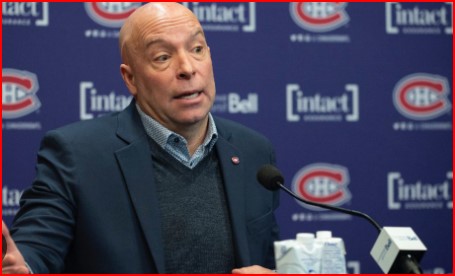Arguing whether Montreal Canadiens general manager Kent Hughes would still have had a successful 2024 trade deadline without moving goalie Jake Allen is an interesting debate. Despite that, let’s attempt it anyway. Hughes ultimately achieved his goals, rendering the argument somewhat moot. However, to summarize: As the trade deadline approached, the Canadiens had only managed to accomplish the following: If Hughes had only secured a first-round pick for all his efforts, it might have seemed somewhat lackluster to some observers. However, objectively speaking, Monahan was the primary asset in his arsenal. By successfully trading him and obtaining what some considered impossible in return, Hughes had essentially fulfilled his obligations before the deadline, positioning himself to address the Allen situation with confidence.

Hughes Gets His First-Round Pick for Monahan
Admittedly, the trade involving Monahan to the Winnipeg Jets occurred over a month before the deadline, which could technically exclude it from being categorized as a deadline deal. However, waiting wasn’t in the Canadiens’ best interest, especially considering the recent trade made by the Calgary Flames involving Elias Lindholm to the Vancouver Canucks, which arguably set the market price for centers.
Furthermore, Monahan has a history of injuries, making waiting for a potentially better offer a risky move for any prudent GM. As long as there was a viable deal on the table, waiting wasn’t a sensible option. Fortunately, there was, so the deal was made swiftly. Additionally, when considering the prices top forwards fetched at the actual deadline, it’s difficult to fault Hughes for his actions in any way.
It appears that Hughes managed to secure what could be considered the standard market value for all the assets he traded, possibly even exceeding expectations in Jake Allen’s case. In the trade with the New Jersey Devils, the Canadiens exchanged Allen for a conditional 2025 third-round pick. This pick could potentially escalate to a second-round pick if Allen plays 40 games next season and the Devils qualify for the playoffs.
Allen Becomes Another Page in Case Study of Hughes’ Brilliance
Even if Allen doesn’t meet the conditions and the Devils don’t make the playoffs, Hughes’ handling of the trade still stands out. Given that the Canadiens effectively traded a third-round pick in the 2020 NHL Entry Draft to acquire Allen back then, it’s challenging to imagine how Hughes could have achieved a better outcome. Considering Allen’s age and declining performance over his tenure with the Canadiens, it would have been understandable if Hughes had received less in return.
With backup goalie Cayden Primeau retained by the Canadiens, Allen had essentially become the third-choice goalkeeper, making his departure inevitable. Moreover, the three-goalie system was proving less effective over time, making Allen’s departure necessary. Despite having to retain salary on Allen’s contract, which extends until 2025, it’s difficult to envision a more favorable outcome for Hughes. Thus, credit is due to him for managing a win in this deal.
Overall, Hughes’ performance at the deadline can be seen as a significant victory. While he didn’t trade away all of the veterans, such a move wasn’t feasible anyway. While there was potential to trade defenseman David Savard, whose contract also runs until 2025, it likely wouldn’t have been worthwhile given the returns other shutdown defensemen were fetching. Keeping Savard allows the Canadiens to utilize his defensive skills and leadership for another season, which is a valuable asset.
Furthermore, retaining Jordan Harris over Savard, despite rumors of either being traded, demonstrates Hughes’ prudent decision-making. Keeping Harris, who offers more long-term value to the organization, indicates that Hughes prioritizes making trades with purpose rather than simply making changes for the sake of it.






